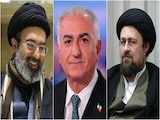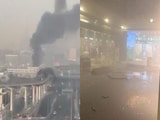Nuclear weapons never bring peace, said the co-chair of Nihon Hidankyo, a group of atomic bomb survivors from Hiroshima and Nagasaki that won the Nobel Peace Prize on Friday.
The Norwegian Nobel Committee in Oslo awarded the group the Nobel prize on Friday "for its efforts to achieve a world free of nuclear weapons and for demonstrating through witness testimony that nuclear weapons must never be used again".
Toshiyuki Mimaki, co-chair of Nihon Hidankyo, broke down in tears at a press conference after the award was announced, saying "never did I dream this could happen".
"It has been said that because of nuclear weapons, the world maintains peace. But nuclear weapons can be used by terrorists," Mimaki told reporters.
"For example, if Russia uses them against Ukraine, Israel against Gaza, it won't end there. Politicians should know these things."
He added that members of the group -- which was founded in 1956 -- were the "average age of 85".
"I hope that the second-generation (of atomic bomb survivors) and the general public participate in peace activities, for peace without nuclear weapons," he said.
Mimaki also said the situation for children in Gaza is similar to what Japan faced at the end of World War II.
"In Gaza, bleeding children are being held (by their parents). It's like in Japan 80 years ago," he said.
"(Children in Japan/Hiroshima Nagasaki) lost their fathers in the war and mothers in the atomic bomb. They became orphans."
The 20th century brought Japan's brutal rampage across Asia and World War II, which ended in 1945 after the United States dropped atomic bombs on Hiroshima and Nagasaki.
The first nuclear bomb hit Hiroshima on August 6, 1945, and killed 140,000 people.
Three days later, the United States dropped an atomic bomb on Nagasaki, killing 74,000 people including many who survived the explosion but died later from radiation exposure.
Japan announced its surrender in World War II on August 15, 1945.
The mayor of Hiroshima, Kazumi Matsui, denounced nuclear weapons as an "absolute evil".
"Hibakusha (survivors) are fast ageing and there are fewer and fewer people able to testify to the meaninglessness of possessing atomic bombs and their absolute evil," he told reporters Friday.
"People in coming generations must know that what happened is not just a tragedy for Hiroshima and Nagasaki, but one that concerns all humanity that must not be repeated."
Prime Minister Shigeru Ishiba also hailed the awarding of the prize to Nihon Hidankyo.
"The fact that the Nobel Peace Prize was awarded to this organisation, which has spent many years working toward the abolition of nuclear weapons, is extremely meaningful," Ishiba told reporters.
(Except for the headline, this story has not been edited by NDTV staff and is published from a syndicated feed.)















